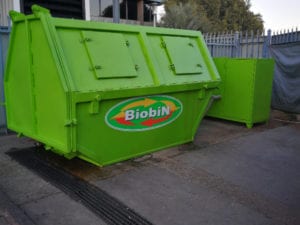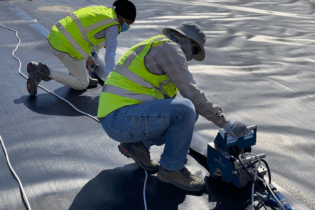In signing the Sustainable Development Goals, South Africa has committed to halving food waste by 2030. BiobiN™, a new waste management system launched in South Africa, offers an easy solution for diverting food and organic waste from landfill.
South Africa produces around 10 million tonnes of food waste per year, around 90% of which is discarded at landfill. BiobiN offers a clean and simple solution to managing food and organic waste that would otherwise end up in landfill. The unique and innovative waste management system safely removes hazardous and odourous elements from organic waste material, while recycling the waste into a safe, environmentally friendly and rich organic compost. “By having a BiobiN on your premises you are not only able to produce high-quality compost, but you also support a solution that seeks to alleviate the pressure on landfill sites due to the biodegradation and composting of organic waste,” says Brian Küsel of BiobiN South Africa. Composting is the solution BiobiN is a containment vessel used for food and organic material, where it starts the process to produce high-grade compost. The importance of compost cannot be underestimated, as it adds carbon to the soil, resulting in reduced water usage and improved yields, which is vital in a country with limited water supply. The vessel has been designed with on-site waste management in mind and seeks to provide an easy and innovative solution for businesses and operations like corporate offices, food outlets, supermarkets, hotels, chicken producers and any operation that produces a lot of food and organic waste and is looking to reduce their waste footprint. “There is a growing need for an organic waste solution such as BiobiN. Food and organic waste in landfill sites rapidly break down to produce methane, an atmospheric pollutant that is 22 times more potent than carbon dioxide,” says Küsel. The team at BiobiN has recognised that organic waste should be seen as a resource that, when captured and processed correctly, will eventually produce a high-quality soil conditioning product.To add to the growing need to divert organic waste from landfill, in 2019, the Western Cape Department of Environmental Affairs announced a 100% ban on organic waste to landfill by 2027, with a 50% commitment by 2022. Earlier in the year, National Treasury implemented South Africa’s first carbon tax bill – imposing a carbon tax for carbon emitting activities.
“With growing pressure from government, the corporate landscape needs to quickly adapt their waste management practices,” says Küsel. “This is also a great opportunity for corporates to show their commitment to reducing their contribution to global warming. A well-implemented recycling system, along with a BiobiN on the premises, is a direct display of a well-thought-out corporate social and environmental responsibility initiative.” Why the BiobiN? Having successfully been launched and piloted in Australia 20 years ago and widely adopted as a green alternative waste disposal solution around the world, BiobiN is now available in South Africa. BiobiN operates on a rental model, which includes trained operating agents on-site, management of the unit, waste reporting and maintenance. As BiobiN has no moving parts, the safety of operators is not compromised. The BiobiN has also been carefully designed to reduce odours, flies and rodents, using a patented aeration system that initiates the composting process of organic material, reducing odours, bacteria and other pathogens. The vessel is sealed to ensure no contamination of surrounding areas and the system kills bacterial pathogens like salmonella, E. coli, avian flu, Newcastle disease and listeria without the use of chemicals or microbes that would have been necessary with other in-vessel composting systems. “This makes it the easiest and most cost-effective on-site food and organic waste management system. It is a clean and simple solution to managing food and organic waste in a way that benefits the environment,” concludes Küsel.






